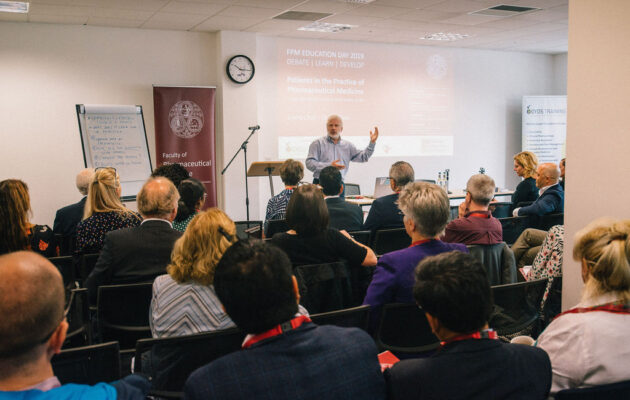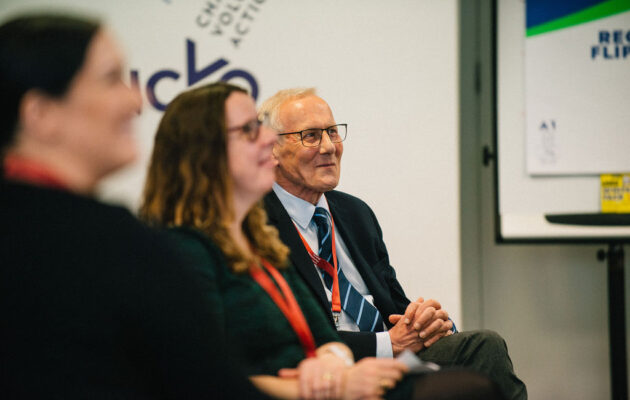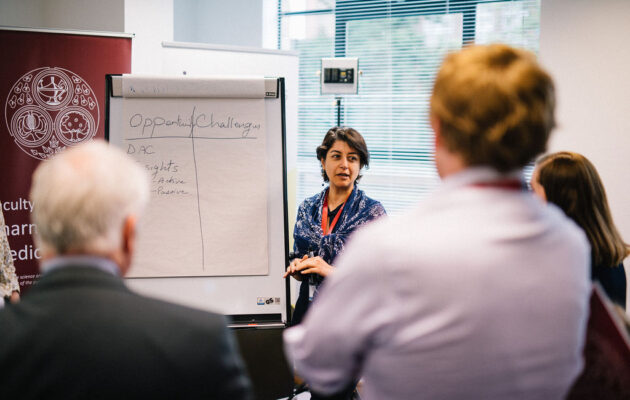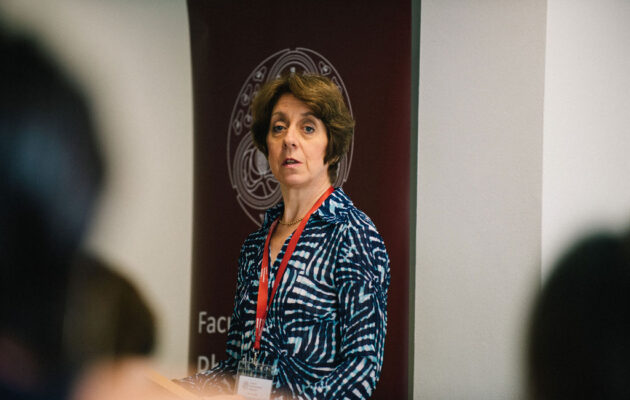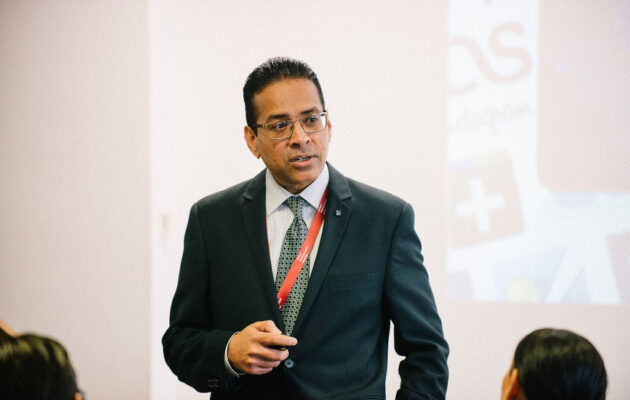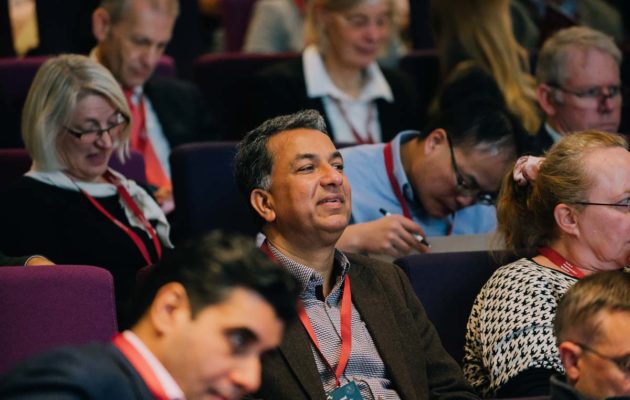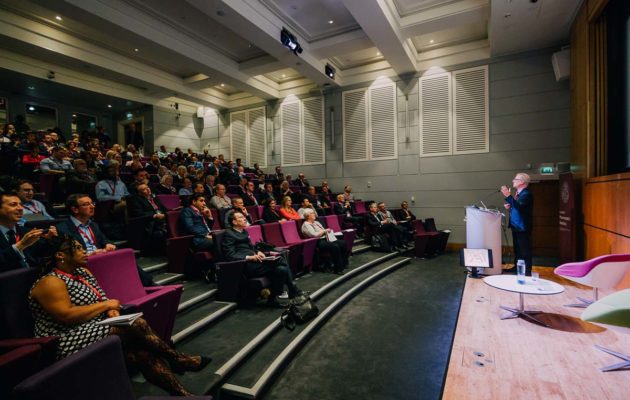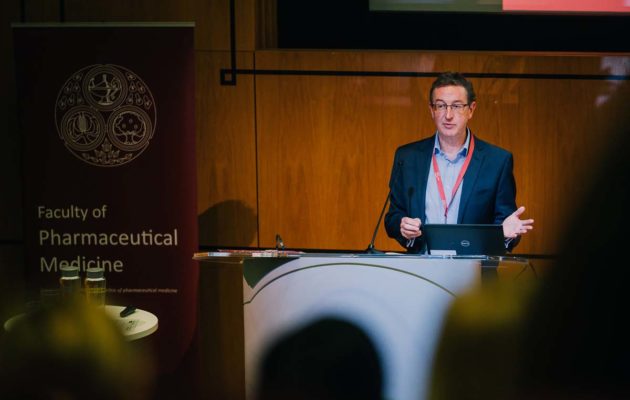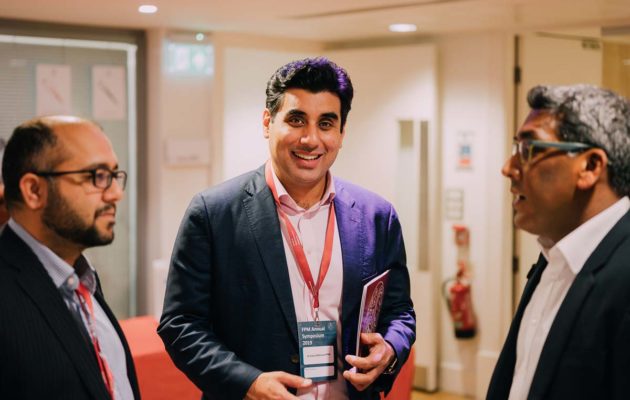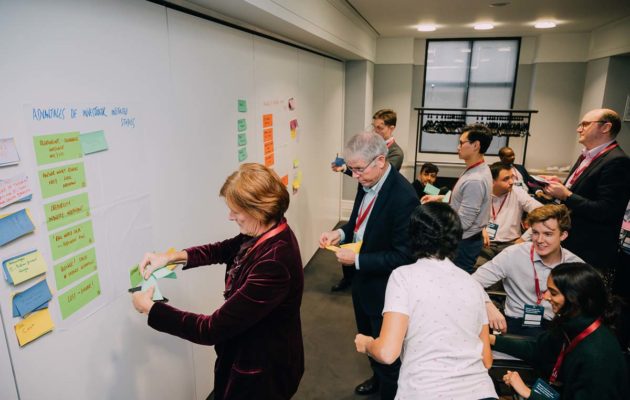FPM Annual Report and Accounts
For the year ending 31 December 2019
President’s Foreword
Thank you, FPM membership and staff, for a successful year in 2019. It was a challenging year for us. In June 2019 we were joined by our new Chief Executive – Dr Marcia Philbin – who has worked tirelessly to steer FPM through these difficult times. As we begin 2020, the pandemic of COVID-19 has struck us all, with significant effects on FPM operations, and our members working in the life sciences. FPM’s plans have been adapted to match the initial challenges. Despite the closure of the offices we have, for the most part, maintained business as usual. Delivery of FPM’s core strategy remains the focus throughout 2020.
We need, in 2020, to continue to collaborate as we have done in 2019. We must continue look abroad where our global industry employs thousands of doctors. Many of these doctors do not have access to the vocational training that the FPM provides in the UK. Discussions with IFAPP and the IFAPP Academy to build common training have progressed. Drawing upon the enormous work undertaken by the IMI project, PharmaTrain, a new Pharmaceutical Medicine Specialty Training curriculum is being created. This will incorporate the General Medical Council’s ‘Generic professional capabilities framework’. The new curriculum will be evaluated and launched in late 2020.
During 2019, we developed the FPM Strategy 2020-22. This is now being implemented. We established the Strategic Advisory Committee, to bring focus to the process of approval of our strategic priorities. This committee’s remit is to evaluate proposals from FPM staff and our operational committees. One of its first recommendations to the Board of Trustees was the piloting this year of online examinations.
At this time, more than ever, it is vital that we stay connected with FPM members and other stakeholders. The biannual electronic Journal of the Faculty of Pharmaceutical Medicine (JFPM) has continued to grow and has created an engaged readership. The JFPM is complemented by frequent bulletins, which are designed to provide the members with up to date news and events, and links into social media channels. The new FPM website is a fantastic new interface that will connect broadly across society and stakeholders. We are anticipating an uplift in engagement with FPM.
Traditional ways of working and communication channels have been severely tested at the beginning of 2020. However, we are pleased to report that we have a suite of remote working tools at our disposal, allowing essential FPM operations, and committees and working groups, to continue almost uninterrupted. As understanding of these new platforms grows, we will expand to our training, use of video lecturing and remote educational events.
In terms of finance, we can reassure you that we are balancing the books and our reserves are holding up. As we enter 2020, we are confident that the impact of COVID-19 on finances can be managed. There will, of course, be challenges in restarting our full programmes when the ‘lock down’ is lifted. Whilst the challenges of COVID-19 have delayed implementation of some of our strategy it has created opportunities for flexibility of working and collaboration which are essential for our growth. I am confident that we can continue to adapt, innovate and deliver on our mission for patients and the public.
Professor Tim Higenbottam
President
The Faculty of Pharmaceutical Medicine, April 2020
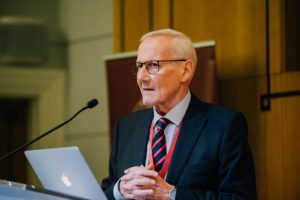

Chief Executive’s Foreword
I am delighted to be writing my first foreword as Chief Executive of FPM. I have been in post since 24 June 2019 and I am enormously impressed by the quality of the work and output from both staff and volunteers. I want to take this opportunity to thank all our members, who volunteer and give so much of their time to support FPM.
2019 was a year of change for FPM and I must extend my sincere thanks to the previous Chief Executive, Kathryn Swanston, who stepped down in 2018. Other notable changes in 2019 include:
- appointment of a new Head of Revalidation Operations
- development of strategic plan 2020-2022
- creation of a new website
- strengthening of social media presence
- revision of the Good Pharmaceutical Medical Practice guide; and
- reinstatement of the President’s Medal which was awarded to five outstanding recipients.
One of my first experiences as Chief Executive was to attend last year’s hugely successful FPM Education Day, on the topic of ‘Patients in the Practice of Pharmaceutical Medicine’. The focus on the patient voice is very important because patients are no longer passive participants in their healthcare. Their lived experience can enrich the process of developing new medicines, designing clinical trials and capturing safety data. FPM Education Day was supported by several patients who gave keynote presentations and led workshops.
Another successful event was the FPM Annual Symposium in November, where the theme was ‘Clinical Research and Life Cycle Management’. One of the most powerful presentations that I have had the honour to witness was by a patient who shared his history of managing his condition with the use of many different drug treatments. Again, the patient experience conveyed the perspective that is not always considered when developing new drug treatment regimes.
I am delighted that the patient perspective is also being drawn upon as FPM redevelops its flagship Pharmaceutical Medicine Specialty Training programme, which will be submitted to the GMC in Autumn 2020.
Even though this Annual report is a review of 2019, I have to say something about COVID-19, which is dominating everything right now. I want to applaud the staff for the way that they have responded to ensure that the business of FPM has continued seamlessly as we transitioned to working from home. I want to assure all our members that because of the prescient work that we have done in 2019, FPM is resilient, and we will continue to innovate and deliver even more for, and with, our members in the future.
Thank you.
Dr Marcia Philbin
Chief Executive
The Faculty of Pharmaceutical Medicine, April 2020

Board of Trustees’ Report
The trustees are pleased to present their annual report together with the audited financial statements for the financial year ended 31 December 2019. The financial statements comply with current statutory requirements, the Memorandum and Articles of Association and the Statement of Recommended Practice – Accounting and Reporting by Charities (SORP FRS 102).
Our purpose
To advance the science and practice of pharmaceutical medicine by working to develop and maintain competence, ethics and integrity and the highest professional standards in the specialty for the benefit of the public.
Public benefit
The charitable purposes of Faculty of Pharmaceutical Medicine (FPM) are set out in the Memorandum and Articles of Association and are:
- to promote the science of pharmaceutical medicine.
- to develop and maintain competence, ethical integrity and high professional standards in the practice of pharmaceutical medicine; and
- to advance knowledge in pharmaceutical medicine.
Pharmaceutical medicine is the medical specialty concerned with the discovery, development, evaluation, licensing and monitoring of medicines and the medical aspects of their marketing.
FPM seeks through its activities to bring about an improvement in the health of the public and patients. Our activities seek to advance the science and practice of pharmaceutical medicine by contributing to the provision of effective medicines for public benefit. The trustees regularly review the aims, objectives and activities of the charity referring to the Charity Commission’s guidance on public benefit.
Strategic aims
We will:
- set standards of practice in pharmaceutical medicine
- provide and support training, examinations and professional development in pharmaceutical medicine
- provide an authoritative voice on pharmaceutical medical issues and the specialty of pharmaceutical medicine
- develop guidance and advice on ethical issues in pharmaceutical medicine
- play a leading role in the development of the science and practice of pharmaceutical medicine within the United Kingdom
- actively participate and contribute effectively in the development of pharmaceutical medicine within the international arena
- develop effective working partnerships with relevant groups and organisations
- advocate for best practice in the specialty and highlight the important role it plays in healthcare and industry
- seek the input and advice of patients and members of the public support the membership with guidance, information and leadership, so that they may improve and innovate in their professional practice
- encourage and facilitate the contributions of the membership towards the work of FPM.
- maintain and develop effective organisational governance; and
- ensure that an effective structure and adequate resources are in place.

Our Activities and Achievements in 2019
2019 has been a year of change for FPM. We said a fond farewell to our long serving Chief Executive, Mrs Kathryn Swanston and welcomed the new Chief Executive, Dr Marcia Philbin. Prior to Dr Philbin’s appointment, Ms Sarah Davis, the Head of Membership and Operations, was the Acting Chief Executive and we thank her for her stewardship of FPM during this time.
2019 marked the 30th Anniversary of FPM and the 5th Edition of the Journal of FPM was a celebration of the last 30 years of pharmaceutical medicine as well as exploring future trends. Dr Flic Gabbay and Professor Peter Stonier were two of the founders of FPM and shared their reflections in the Journal via a special video.
Dr Flic Gabbay and Prof Peter Stonier
The Origins of the Faculty of Pharmaceutical Medicine
Education and Standards
FPM sets the standards for doctors and other professionals working and training in the field of pharmaceutical medicine. The several examinations and training programmes we deliver are based on and promote these standards.
As with the other Royal Medical Colleges and Faculties, FPM is writing a new pharmaceutical medicine specialty training curriculum, which will incorporate the General Medical Council’s (GMC’s) ‘Generic professional capabilities framework’. The GMC has conditionally approved our purpose statement to the new curriculum, and we are working to complete writing the rest of the curriculum for submission to the GMC in Autumn 2020.
In collaboration with the ABPI and Brighton and Sussex Medical School (BSMS), FPM continues to support the drug discovery and development undergraduate programme at BSMS – a landmark educational pilot aimed at providing medical undergraduates with an understanding of the process of drug discovery and development. The programme utilises a spiral curriculum approach where medical students receive education throughout their undergraduate years of study. The modules are based on the following:
- Ethics
- Drug development
- Pharmacovigilance & Regulation
The curriculum has been well received by undergraduates and in response to student feedback, future lectures will be designed to be more interactive.
Other medical schools have expressed interest in adopting a version of the curriculum. As face to face teaching will be difficult to scale, other delivery methods are under consideration, such as videos or online delivery.
We continue to provide guiding principles on professional standards for all pharmaceutical physicians. Our Good Pharmaceutical Medical Practice, first published in 2014, provides all doctors practising pharmaceutical medicine around the world with specific guidance and direction on expected standards, conduct and behaviour. During 2019 we completed the process of updating this important document with publication due in 2020.
The Diploma and Certificate of Human Pharmacology is undergoing a refresh, with direction from the Board of Trustees’ and the Education and Standards Committee. Support has been provided by the Human Pharmacology Advisory Committee plus major Stakeholders including the MHRA.
The activities described above are undertaken to enhance training and assessment of capabilities in pharmaceutical medicine. FPM also supports its members to help them build their own resilience to the challenges they face in life as well as help them to support others who may be in distress. A new training course called Mental Health Awareness Training addressed these key themes. and due to its success, another training course will be run again later in 2020.
Our other successes this year include:
- Introduced the Certificate in Pharmaceutical Medicines
- Enabled successful candidates to use the designatory letters DPM and CPM after their names
- Awarded the Certificate of Pharmaceutical Medicine to 79.5% (31 out of 39) candidates
- Achieved the best pass rate in the Diploma in Pharmaceutical Medicine exams in over 10 years (74% (32 out of 43) candidates)
- Facilitated 95% of trainees and 87% of Educational Supervisors to participate in GMC National Training survey of the Pharmaceutical Medicine Training Programme (PMST)
- Achieved 84% of trainees and 72% of Educational Supervisors expressing satisfaction with PMST
- Enrolled 24 candidates onto the PMST programme
- Supported 14 candidates to complete the PMST programme
Events
During 2019 FPM delivered educational and policy focussed events and meetings. Two themed ‘Conversation’ evenings covered the topics of ‘Should pharma pay doctors?’ and ‘Trust and transparency in the pharmaceutical industry’.
We also launched a new event format in 2019 with a Discovery Day on ‘Real World Data’. This event was developed and led by members of our ‘real world data’ working group. The fact that this event sold out demonstrated an appetite for new themes and formats.
We held our annual Education Day on 12 June 2019 and the theme was ‘Patients in the Practice of Pharmaceutical Medicine’. The event was attended by 66 delegates. We had the pleasure of having four patients join pharmaceutical physicians to lead the four workshops.
The Annual Symposium was on the topic of clinical research and was attended by 130 delegates, receiving excellent feedback from delegates, speakers and sponsors.
Training
In 2019, FPM expanded the range of training that it provides for its members. The training is focused on improving the technical, professional and personal skills of members.
The training we provided in 2019 included sessions on:
- Culture: Skills for Global Working
- Effective Educational Supervision
- Gravitas masterclass
- Appraiser training
- The Code in the Day training
- Mental Health Awareness training
- Managing Medical Emergencies in Human Pharmacology
Revalidation
FPM is a Designated Body for providing annual appraisals and GMC revalidation. Tony Roche was appointed as the new Head of Revalidation Operations and joined FPM in July 2019. On 31 December 2019, 613 members had a prescribed connection to FPM as a designated body and 589 appraisals were completed April 2019 to March 2020.
November 2019 saw the first NHSE ‘quality visit’ of the Designated Body since the introduction of revalidation in December 2012. The NHSE visit team identified several areas of good practice which included: ‘Strong evidence of good practice and effective systems and a willingness to acknowledge challenges, improve governance and revisit previous decisions as new thinking emerges”.
Recommendations for FPM included the following:
- Review processes to tighten governance and support the Responsible Officer’s responsibility to have oversight of any issues with doctors
- Change the job title of ‘Revalidation Advisor’ to ‘Senior Appraiser’ or similar to avoid confusion
- Review and amend the registration process to ensure all paperwork is in place prior to connection
- Introduce a contract or self-declaration form to provide assurance that there are no outstanding issues until such a time as newly connected doctors complete a first appraisal with FPM
- Recommendation FPM ask for a copy of the DBS check for any doctor who sees patients
Communications and Advocacy
An important area of FPM’s activity is our public policy work and our responses to consultations. FPM has several Expert Groups made up of FPM member volunteers who have an in-depth knowledge within key areas. Expert Groups respond to press releases, consultations and publications. A new group on medical devices has now been established and a Patients Expert Group is also currently in development.
The current Expert Groups are listed below:
- Government Policy
- Orphan Gene Therapy
- Clinical Development
- Paediatrics and Vulnerable Groups
- Key Therapy Areas
- Oncology
- Medical Devices
In 2019, FPM contributed to several major consultations and inquiries, including the following:
- Participating in RCP London’s consultation on UK public health research goals
- Advising on changes to the Human Medicines Regulation 2012 (HMR2012) to ensure the continuity of supply of medicines; and
- Providing input into the EMA’s ‘Guideline on quality, non-clinical and clinical aspects of medicinal products containing genetically modified cells’ and ‘Regulatory Science to 2025: Strategic Reflection’ consultation
- Participation by Dr Penny Ward Penny Ward, Chair of Policy expert group, in an interview on the BBC 5pm programme on the impact of Brexit and medicines shortages
These activities help to develop national and global policy or regulations in areas associated with pharmaceutical medicine.

Publications
FPM publishes the biannual Journal of the Faculty of Pharmaceutical Medicine (JFPM) as well as regular email bulletins. These have the aim of raising awareness and increasing knowledge on selected topics. In 2019, our Spring/Summer JFPM focused on Digital Health, with the Autumn/Winter edition celebrating our 30 years as a Faculty with articles and videos covering the development of the specialty over this time. Monthly bulletins throughout the year provided members with regular updates on FPM activities and news.
Work on the development of guidance and appropriate rules of engagement around the ABPI Code of Practice amongst those working in clinical medicine has continued and this document is now out for public consultation. An updated version of the Good Pharmaceutical Medicine Practice document has also been finalised and is undergoing a consultation process with publication due in 2020.
Digital Communications
FPM is active on social media channels, primarily Twitter (620 followers) and LinkedIn (3,740 followers). We use social media to engage with our members and non-members on topics of relevance to pharmaceutical medicine, to promote our events and projects and to spark discussion and debate on the science, ethics and regulation of the specialty.
A new website for FPM was in development throughout 2019 and launched in March 2020.
Membership Support
FPM is a professional membership organisation with members who are practising pharmaceutical physicians or those with a professional interest in the specialty. On the 31 December 2019 we had a total of 1,502 members in all categories, and membership numbers have remained stable during the year. There has been no change in the overall proportion of members based outside of the United Kingdom since this time last year with 21% based in over 35 countries. Those who have retired from professional practice can retain their membership of FPM and contribute to its work.
The routes to becoming a Member (MFPM) of FPM were reviewed in 2019 and the number of recognised qualifications extended, these are summarised below:
- Diploma in Pharmaceutical Medicine awarded by Faculty of Pharmaceutical Medicine
- Diploma in Human Pharmacology awarded by Faculty of Pharmaceutical Medicine
- Diploma in Experimental Therapeutics awarded by Faculty of Pharmaceutical Medicine
- Diploma in Pharmaceutical Medicine awarded by Free University, Brussels
- Diploma of Advanced Studies in Pharmaceutical Medicine awarded by the University of Basel/ECPM
FPM’s other membership categories, Affiliate, Associate and Fellowship, are detailed in the full report.
President’s Medal
In 2019, the FPM President’s medal was reinstated to recognise members of FPM as well as non-FPM members who have made significant contribution to FPM or pharmaceutical medicine in general. Following a review, five recipients were awarded the medal.
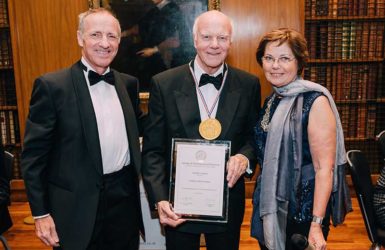
Professor Malcolm Boyce
Professor Malcolm Boyce worked as a research physician in drug development for the pharmaceutical industry for 17 years before leaving to start what later became Hammersmith Medicines Research. He has been the Medical and Managing Director of the company for the last 26 years, during which time he has grown it into a multi-million pound enterprise that has been recognised with awards and notable achievements, including three Queen’s Awards for International Trade.
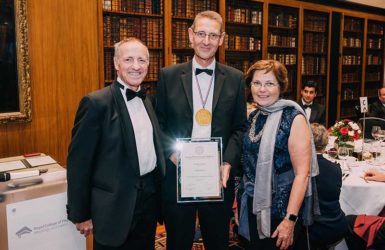
Dr Ian Hudson
Dr Ian Hudson is a physician who practised as a paediatrician for several years, before working in the pharmaceutical industry in clinical research and development and then devoting himself to the regulation of medicines and devices.
In September 2013 Dr Hudson’s achievements saw him appointed as Chief Executive of the MHRA, a position that he held until September 2019.
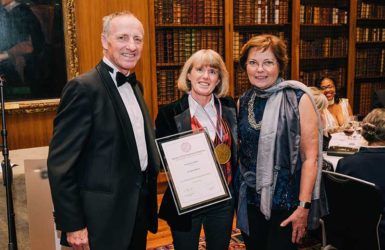
Dr Juliet Roberts
Dr Juliet Roberts is an inspirational leader and mentor for the specialty of pharmaceutical medicine. Through her clinical development work in several roles at Boehringer Ingelheim, she has helped bring innovative new medicines to benefit patients. Dr Roberts is also passionate about education, training and qualifications for pharmaceutical physicians. She is an educational supervisor, a specialty advisor, and a responsible officer for Revalidation at her company. She has been Chair of the FPM Board of Examiners for six years and Vice-Chair before then.
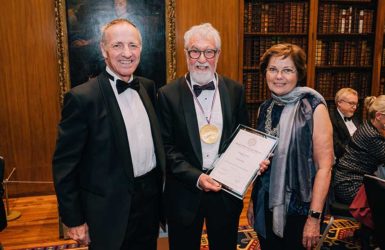
Dr Richard Kay
Dr Richard Kay well known amongst pharmaceutical physicians, as a distinguished statistician. After spending 15 years in academia, he set up his first company, S-Cubed, in 1989, which subsequently merged, in 1997, with Parexel International. He held the position of Vice-President at Parexel and was Worldwide Head of Statistics and Statistical Programming from 1999 to 2004. In 2005 he left Parexel to focus on his core interests of statistics. For over twenty years he has been integral to the development of the curriculum for Pharmaceutical Medicine Specialist Training (PMST), and for the statistical and data management content and update of the Syllabus for Pharmaceutical Medicine, from which courses, curricula and examinations are derived.
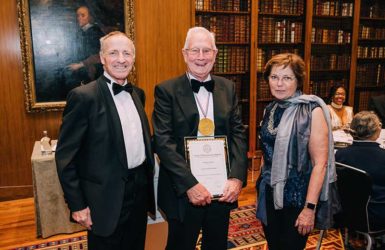
Professor Martin Kendall
Professor Martin Kendall is Emeritus Professor of Clinical Pharmacology at the College of Medical and Dental Sciences, University of Birmingham. He was appointed Senior Lecturer and Consultant. He was later appointed Professor and trained a generation of doctors, some of whom became clinical pharmacologists working in the NHS, Academia and the drug. Professor Kendall was, from 2000 to 2008, the chair of the British National Formulary (BNF) Joint Formulary Committee, which oversees the clinical content of the BNF. He was also a keen lobbyist for the creation of a paediatric version of the BNF, culminating in the publication of the first BNF for Children in 2005.
Future Plans
FPM has developed a new strategy for 2020-2022 and agreed a new vision statement which is “A world where effective medicines meet the needs of patients”.
There are four strategic priorities:
- Set and appraise standards for training in and practice of pharmaceutical medicine
- Promote understanding of pharmaceutical medicine to create trust
- Engage with clinical doctors to promote pharmaceutical medicine as a career option and support all FPM members in their training and practice
- Ensure good governance and financial stability
The work on strengthening the governance of FPM commenced in 2019 with the formation of the Governance working group which is chaired by the Registrar and the review is expected to be completed by the end of 2020. The purpose of the review is to:
- clarify key roles and relationships on the Board of Trustees
- clarify functions and powers delegated by the Board to committees
- understand the accountability to the Board of Trustees; and
- update and amend the existing regulations.
As part of developing the new strategy 2020-2022, new organisational values for FPM to guide the behaviour of staff, officers, trustees, members and stakeholders were developed in June 2019. Values are important to a modern organisation as they shape the culture, support decision-making, boost performance but most importantly, guide behaviour.
A programme of activities will be developed to launch the values and begin the task of embedding them into the processes, functions and culture in FPM.
The new values agreed for FPM are:
| We are: | This means |
|---|---|
| Professional | Being accountable for our work and actions |
| Innovative | Seeking solutions proactively |
| Caring | Treating everyone with dignity |
| Collaborative | Working positively with others |
| Credible | Being honest and ethical in our work |
| Learned | Investing in developing knowledge and skills |

Activities planned for 2020 include:
- FPM’s ongoing response to the COVID-19 crisis
- Investment in platforms to deliver online exams and training
- Recruit a new Membership and Events Manager
- Produce a Memorandum of Understanding to enable collaborative work with IFAPP and IFAPP academy
- Revamp the award ceremony including new award categories
- Review the digital infrastructure in FPM as part of the modernisation plan
The ongoing concerns regarding COVID-19 meant that practical, unobtrusive and preventative measures were taken to protect staff and visitors to the FPM building at Angel Gate, London. A COVID-19 risk register was developed, and mitigation steps included new processes such as allowing the Designated Body to implement remote appraisals.
Once the government made the decision to implement lockdown for the UK population, the FPM office quickly operationalised activities so that the business continued seamlessly with the staff working remotely. For example, telephone extensions were linked to the staff’s newly acquired mobile telephones to ensure that FPM members could still contact the office with their queries. An additional licence for GoToMeetings was also purchased so that FPM could hold two parallel video conferences. This ensured that the schedule of committee meetings continued as part of FPM’s business continuity plan.

